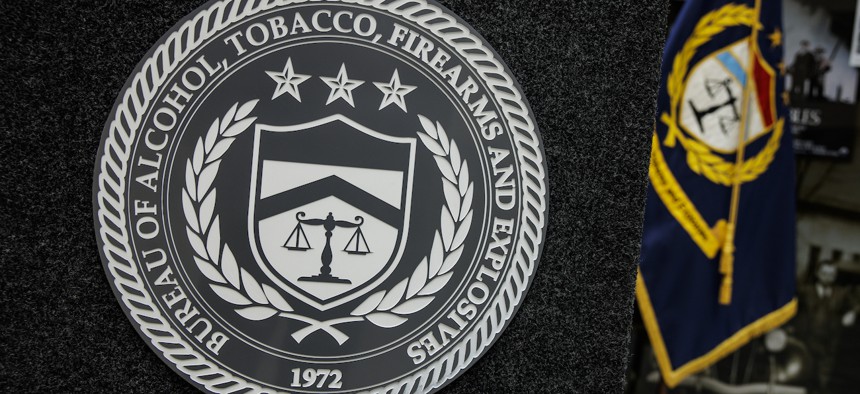
Whistleblowers told the Office of Special Counsel that the OSC report, and OPM’s audit, don’t fully capture the “extent of ATF’s illegal practices” or the full impact of the harm. Samuel Corum/Getty Images
OSC: ATF Wasted At Least $10 Million Misclassifying Administrative Jobs as Law Enforcement
Although OPM and ATF investigations found around 100 positions within the agency’s HR department were improperly provided enhanced law enforcement pay and benefits, the whistleblowers who prompted the probe said the problem is more widespread than that.
The Bureau of Alcohol, Tobacco, Firearms and Explosives has been systematically misclassifying administrative positions in its headquarters as law enforcement jobs, improperly costing the agency millions in pay and benefits over a five-year span, according to an Office of Special Counsel report published this week.
The Office of Personnel Management, ATF and the Justice Department all investigated the matter following allegations of two whistleblowers that under longstanding agency policy, ATF “systematically and intentionally” misclassified upper-level jobs in administrative roles as law enforcement positions, allowing those hired to receive enhanced retirement benefits and Law Enforcement Availability Pay, a type of premium pay reserved for federal law enforcement officers who may be required to be on call to do work outside of the normal 40-hour work week.
OPM’s audit of ATF, which covered the 2016 through 2021 fiscal years, found 91 misclassified positions across four bureau directorates, while ATF itself identified another 17 misclassified jobs. ATF agreed with OPM on 70 of the misclassified posts, and the agencies continue to discuss whether 38 other jobs must be reclassified or simply provided new position descriptions. And OPM said ATF’s career plans for these jobs, which mandate 52 weeks “of continuous service in permanent positions at ATF headquarters” in order for employees to be promoted, “deviated from OPM qualification standards.”
According to an ATF assessment of the misclassified jobs over OPM’s five-year audit period, the costs associated with providing enhanced retirement benefits and Law Enforcement Availability Pay were at least $9.7 million, if you include only the 70 positions ATF believes are misclassified, although that estimate raises to $19.7 million if all 108 positions are ultimately ruled to have been misclassified.
ATF continues to provide Law Enforcement Availability Pay to 16 employees OPM said were in misclassified positions because the bureau argued that they work at ATF’s national academy.
“Per ATF, these individuals are required to be available outside their core responsibilities and are expected to perform other unscheduled overtime duties related to their respective positions,” U.S. Special Counsel Henry Kerner wrote.
Following the audit, OPM suspended ATF’s authority to classify positions within the General Schedule’s law enforcement occupational family beginning in November 2020. ATF has discontinued the career plans for jobs in the special agents and industry operations investigators, and since then, OPM, the Justice Department and ATF have been in “ongoing discussions” on how best to remediate the situation, while ATF has begun updating the jobs’ position descriptions to better reflect employees’ job duties.
“In May 2021, the agency gave the incumbents in the 70 positions the agencies agree are misclassified three options: (1) reassignment; (2) remaining in the position following reclassification as a non-law enforcement officer, contingent on the ability to qualify for the position; or (3) retirement that calendar year,” the report states.
As of March, 15 of the positions have been reclassified with the employees remaining on the job and 36 employees were reassigned to new position descriptions. Another 14 had retired, three were promoted, and two transferred out of their positions.
But the whistleblowers both told the Office of Special Counsel that the OSC report, and OPM’s audit, don’t fully capture the “extent of ATF’s illegal practices” or the full impact of the harm.
“Specifically, the whistleblowers believed that there were many more misclassified positions than were captured in the audit and that the agency significantly underreported the waste directly and tangentially associated with the widespread practice of misclassifying positions,” Kerner wrote. “Moreover, they pointed out that the agency did not account for the impact of the wrongdoing on the agency’s non-law enforcement employees.”
In a 2022 letter to Kerner accompanying the Justice Department and ATF’s investigative report on the matter, Associate Deputy Attorney General Bradley Weinsheimer stressed that the Justice Department and ATF are both actively working to resolve the misclassification problem and to implement policies to prevent it from happening again.
“The agencies are working cooperatively and methodically to resolve matters as quickly as possible, as further reflected in the report,” Weinsheimer wrote. “As noted, ATF has continually worked with [OPM’s Classification and Assessment Policy Office] to implement corrective actions. New policies are in place, and in an ongoing process, positions have been reclassified and a number of employees have been reassigned. The reclassification process and other corrective actions are ongoing, with ATF working as expeditiously as possible to complete the process in accordance with OPM standards and the ongoing discussions with OPM.”







